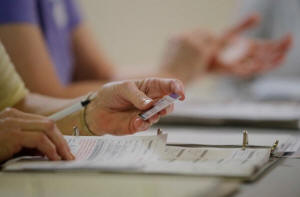|
 Federal
judge upholds voter ID law in North Carolina Federal
judge upholds voter ID law in North Carolina
 Send a link to a friend
Send a link to a friend
[April 26, 2016]
By Colleen Jenkins
WINSTON-SALEM, N.C. (Reuters) - A federal
judge upheld a North Carolina law on Monday that requires voters to show
certain forms of photo identification at the polls, in a key victory for
Republicans in a presidential election year who say the law is needed to
prevent fraud.
|
|
 The case tested a central piece of broad voting restrictions
passed after the U.S. Supreme Court ruled in 2013 that North
Carolina and other states with a history of discrimination no longer
needed federal approval for voting law changes affecting minorities. The case tested a central piece of broad voting restrictions
passed after the U.S. Supreme Court ruled in 2013 that North
Carolina and other states with a history of discrimination no longer
needed federal approval for voting law changes affecting minorities.
In siding with Republican Governor Pat McCrory and other state
officials in dismissing challenges to the law, U.S. District Judge
Thomas Schroeder in Winston-Salem wrote in a 485-page ruling that
North Carolina "has provided legitimate state interests for its
voter-ID requirement and electoral system."
"In sum, plaintiffs have failed to show that any North Carolinian
who wishes to vote faces anything other than the 'usual burdens of
voting,'" Schroeder wrote.
 The National Association for the Advancement of Colored People and
individual voters backed by the U.S. Justice Department had argued
that the law disproportionately burdened African-Americans and
Hispanics, who are more likely than whites to lack the acceptable
forms of identification.
Democrats argue voter ID laws passed by Republican-led state
legislatures target voters who typically support the Democratic
party. Proponents of the measures say they are intended to prevent
voter fraud.
The trial in Winston-Salem was one of a number of closely watched
voting rights battles across the country playing out as Democrats
and Republicans fight for the White House in November.
Governor McCrory, locked in a tough race for re-election this year,
said in a statement: "This ruling further affirms that requiring a
photo ID in order to vote is not only common-sense, it's
constitutional."
The North Carolina law requires voters to show approved credentials
such as a driver's license or passport before casting a ballot.
Voters who cite a "reasonable impediment" to obtaining such
identification are allowed to cast a provisional ballot.

[to top of second column] |

Schroeder also upheld provisions that eliminated a week of early
voting, same-day registration, and prohibited the counting of
out-of-precinct ballots.
Schroeder said that the plaintiffs did not establish that blacks or
Hispanics had less opportunity than others to participate in the
electoral process, and pointed out that North Carolina joins only
South Carolina in extending voters the "reasonable impediment"
accommodation.
Opponents of the law said they would pursue an appeal.
William Barber, president of the North Carolina State Conference of
the NAACP, called the "restrictive provisions" in the law "an
affront to democracy" and vowed to continue the fight against
"regressive and discriminatory voter suppression tactics."

(Reporting by Colleen Jenkins in WINSTON-SALEM, N.C., Writing and
additional reporting by Eric M. Johnson; Editing by Simon
Cameron-Moore)
[© 2016 Thomson Reuters. All rights
reserved.]
Copyright 2016 Reuters. All rights reserved. This material may not be published,
broadcast, rewritten or redistributed. |